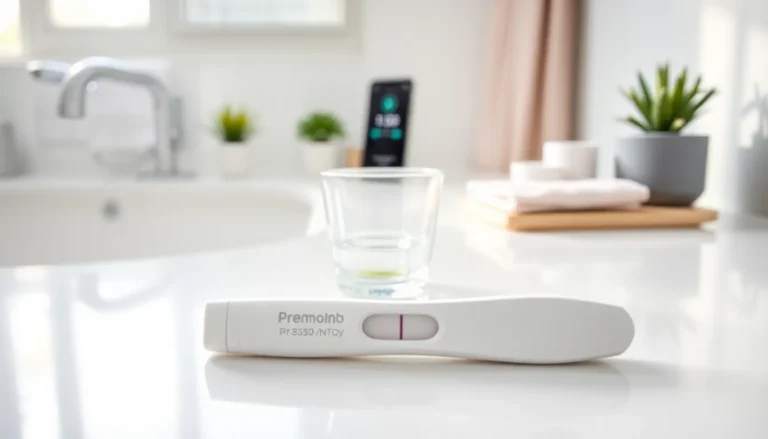Pregnancy is a time of wonder, joy, and frequent trips to the bathroom, who knew tiny humans could require so much? But amidst the backaches and nursery planning, there’s a critical conversation that often gets overlooked: iron deficiency. Enter ferrous sulfate, a superhero in the world of prenatal care. Iron deficiency anemia isn’t just a fancy medical term: it can pose real risks to both mom and baby. So, let’s immerse and discover why ferrous sulfate might just become your new best friend during this incredible journey.
Table of Contents
ToggleUnderstanding Iron Deficiency Anemia in Pregnancy

Iron deficiency anemia is a common condition during pregnancy, affecting about 15 to 25% of expecting mothers. It occurs when the body lacks enough iron to produce hemoglobin, the protein responsible for carrying oxygen in the blood. Pregnancy dramatically increases iron requirements due to the growing fetus and expanding blood volume, making it easy for some women to fall behind. If left untreated, this deficiency can lead to fatigue, weakness, and complications during pregnancy, including preterm delivery and low birth weight. Understanding the signs and symptoms is crucial, as some women may feel exceptionally tired or short of breath without realizing that low iron might be the culprit.
Importance of Iron for Maternal and Fetal Health
Iron plays a vital role in more than just keeping energy levels up: it is essential for the development of the baby’s brain and muscles. Also, adequate iron levels not only help prevent anemia in the mother but also contribute to a healthy pregnancy outcome. During pregnancy, the mother’s iron needs increase significantly, up to 27 mg of iron per day is recommended. Without sufficient iron, a mother’s body struggles to provide enough oxygen to the baby, which can hinder fetal development. So, ensuring adequate iron intake is not just beneficial: it is essential for nurturing new life.
Benefits of Ferrous Sulfate
Ferrous sulfate is a widely recommended form of iron supplementation during pregnancy. This compound is not only effective in boosting iron levels but is also relatively well-tolerated. The body can absorb ferrous sulfate more efficiently than some other forms of iron, making it an excellent choice for pregnant women. Depending on individual health needs, ferrous sulfate can relieve symptoms of iron deficiency anemia effectively. Many healthcare providers encourage its use because it helps maintain healthy oxygen levels in the bloodstream, eventually benefiting both mother and baby. Its affordability and availability make it a go-to supplement during these transformative months.
Dosage and Administration Guidelines
Determining the right dosage is critical: healthcare providers usually recommend ferrous sulfate at a dosage of 325 mg, which contains 65 mg of elemental iron. It’s generally taken once or twice daily, depending on the severity of the deficiency. It’s worth noting that ferrous sulfate should be taken on an empty stomach for better absorption. But, some women may experience gastrointestinal discomfort when doing so. In such cases, pairing the supplement with food can alleviate these side effects, although this may slightly reduce absorption. Always consult a healthcare provider before starting iron supplements or altering dosage, as individual needs vary.
Potential Side Effects and Considerations
While ferrous sulfate is essential for addressing iron deficiency, it’s not without potential side effects. Common side effects include constipation, nausea, and stomach upset. Important considerations should be taken into account before starting high-dose supplements, as excessive iron can lead to toxicity. Symptoms of iron overdose can include abdominal pain, vomiting, and even organ damage in severe cases. Monitoring is key: regular blood tests can help track hemoglobin and ferritin levels, ensuring mothers receive adequate but not excessive iron throughout their pregnancy.
Dietary Sources of Iron
Plus to ferrous sulfate, pregnant women should incorporate iron-rich foods into their diets. Excellent sources of iron include red meats, poultry, fish, beans, lentils, and fortified cereals. Vegetables such as spinach and broccoli also contain iron, though its absorption may be less effective compared to animal sources. Pairing these foods with vitamin C-rich items like oranges or bell peppers can enhance iron absorption. Eating a well-balanced diet rich in iron is a great complement to supplementation, providing a safer, more holistic approach to maintaining adequate iron levels during pregnancy.
Consulting Healthcare Providers
As with any health-related matter, consulting a healthcare provider is indispensable. The journey of pregnancy is filled with unique challenges and dietary needs that can vary significantly from one woman to another. Healthcare providers can conduct blood tests to diagnose iron deficiency accurately and ascertain the appropriate dosage of ferrous sulfate. Besides, they can provide insights into the best dietary practices to support overall well-being. Open communication with a healthcare provider is essential to navigate the complexities of pregnancy health.


